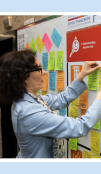Building Back Better: toward a disability-inclusive, accessible and sustainable post COVID-19 world

The International Day of Persons with Disabilities (IDPD) on 3rd December reminds us to promote the full and equal participation of persons with disabilities and to take action for their inclusion in all aspects of society and development. Internally and externally, the EU is committed to promoting the full and equal participation of persons with disabilities. A side-event with UN Secretary General Special Envoy for People with Disabilities, hosted by the EU Delegation in Geneva, shed light on the EU’s external commitment by focusing on EU assistance to people who have fallen victim to mines.
The EU and all its Member States are parties to the UN Convention on the Rights of Persons with Disabilities (CRPD), while the European Accessibility Act aims at ensuring accessibility of products and services at the European level. Almost one in four Europeans is a person with disability. The COVID19 pandemic has revealed even more the barriers that many persons are still facing. In this light, the EU Commissioner for Equality, Helena Dalli has announced to present a new EU Disability Rights Strategy in the coming months. In her statement, Commissioner Dalli stressed: “The pandemic was a stark reminder of the barriers that persons with disabilities continue to face on a daily basis in the European Union and beyond. We must remove those hurdles. The EU is fully committed to promoting the rights of people with disabilities. Yet despite the progress we have made over the past years, there is still a long way to go.” https://twitter.com/helenadalli/status/1334487473112563713 The EU Delegation celebrated this important day with partners in Geneva and across regions, by passing a strong message of the need to respond fully to the needs of people with disabilities, while also marking 23 years since the signing in Ottawa of the Anti-Personnel Mine Ban Convention. Ms. Maria Soledad Cisternas Reyes, the UN Special Envoy for People with Disabilities was invited to share her views on further actions at national and international level to assist mine victims and help them enjoy the full rights they are entitled to. She underlined that mine victims, persons with disabilities, need to be able to access all range of services available in any society. This accessibility was considered critical for their full enjoyment of human rights. This lack of access results in poverty and inequality, which are compounded in this period by the global coronavirus pandemic. https://twitter.com/EU_UNGeneva/status/1334516340644864003 The Special Envoy noted that people with disability have been among the most vulnerable populations during the current COVID-19 outbreak due to many health, social and environmental barriers, discriminatory attitudes and inaccessible infrastructure. “It is fundamental that the response to the pandemic is inclusive and takes into account the views of the persons with disabilities”. Maria Soledad Cisternas Reyes asked the European Union to continue to assist countries, mine-affected States, develop national legislative frameworks and national action plans helping persons with disability. She considered that fostering inclusive societies, respectful of the political, social, economic and cultural rights of persons with disabilities, empowering them, was fundamental for advancing towards the achievement of the Sustainable Development Goals. https://twitter.com/MineBanTreaty/status/1332430504587653121 The European Union noted that its comprehensive mine action strategy recognized the centrality of victim assistance as a fundamental implementation standard of the Mine Ban Convention. EU remains committed to strengthening the care, rehabilitation and socio-economic reintegration of women, girls, boys and men who are victims of anti-personnel mines, cluster munitions and explosive remnants of war. “The Council of the European Union underlined the strong linkage between victim assistance in mine action and the Convention on the Rights of Persons with Disabilities”, the EU representative said. The EU Council Decisions of last 10 years supported 12 States with the development of national action plans for the inclusions and assistance of persons with disabilities. The EU will continue to provide concrete and sustainable assistance to anti-personnel mine and other explosive remnants of war survivors, to their families and communities.The Special Envoy for the universalization of the Anti-Personnel Mine Ban Convention, HRH Prince Mired of Jordan, sent a video message during the event, in support of the Convention. Closing the event, the Chairman of the Committee on Victims Assistance of the Anti-Personnel Mine Ban Convention, H.E. Sek Wannamethee, Ambassador of Thailand, underlined the complementarity between this Convention and the Convention on the Rights of Persons with Disabilities and the need for an inter-sectoral approach in their implementation. Watch also our video on EU’s commitment to a world free of mines: https://www.youtube.com/watch?v=Ze8xu-J9MoY





